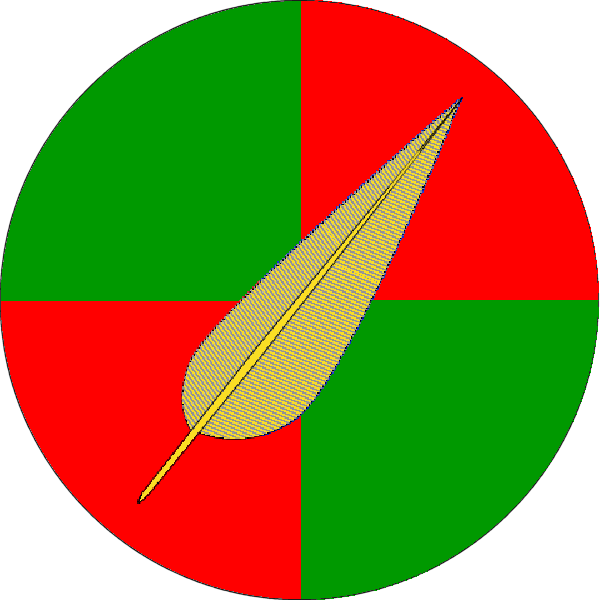Law:59RZ22 The Succession Amendment
 EPHEMERAL STATUS |
LEGEU |
It amends the following: |
| Per 185 — Con 0 — Aus 15 |
| Per 7 — Con 1 — Aus 0 |
L'Anuntziă dels Legeux |
View Clark Result |
Whereas, the monarchy is a central pillar of the country and its survival depends on its planned future as well as its activity,
and Whereas, this allows for democratic confirmations without becoming wholesale elections,
THEREFORE, the Ziu directs that Article II of the Organic Law, which currently read:
Section 1 The Kingdom of Talossa is a constitutional Monarchy with a King (or, if female, Queen) as its head of State.
Section 2 The King is the symbolic head of the nation. The nation democratically grants the King certain Royal Powers and duties as described in this Organic Law and in statute law. The Ziu may establish procedures for when the King fails to perform a duty.
Section 3 The King of Talossa is King John I, until his demise, abdication, or removal from the throne. Should the King at any time renounce or lose his citizenship, that renunciation or loss shall be deemed to imply his abdication of the Throne. Upon the demise, abdication, or removal from the Throne of the King, the Uppermost Cort shall be a Council of Regency.
Section 4 In dire circumstances, when the King is judged by competent medical authority to be incapable of executing his duties, or if he is convicted by the Talossan Uppermost Cort of violation of this Organic Law, treason, bribery, nonfeasance endangering the safety, order or good government of the Kingdom, or other high crimes, the nation may remove the King from the Throne. The Cosa shall pronounce by a two-thirds vote, with the approval of the Senäts, that the King is to be removed, and this pronouncement shall immediately be transmitted to the people for their verdict in a referendum. If a two-thirds majority of the people concur, the King is removed.
Section 5 The King may, at whim, appoint, replace, or remove a Regent (or a Council of Regency, which is considered equivalent to a Regent), who shall administer the government in the name of the King, and exercise all powers Organically or legally vested in the King, except the power to appoint or replace a Regent. No person not a citizen of Talossa shall be competent to serve as Regent or member of a Council of Regency. The Ziu may by law remove or replace any appointed Regent, and if the Ziu removes a Regent appointed by the King, the King may not reappoint the same person Regent without the prior consent of the Ziu.
Section 6 The King may grant titles of nobility and confer awards and decorations.
shall be amended to read as follows:
Section 1 The Kingdom of Talossa is a constitutional Monarchy with a King as its head of State.
Section 2 The King is the symbolic head of the nation. The nation democratically grants the King certain Royal Powers and duties as described in this Organic Law and in statute law. In addition, the King may grant titles of nobility and confer awards and decorations. The Ziu may establish procedures for when the King fails to perform a duty.
Section 3 The King of Talossa is King John I, until his demise, abdication, or removal from the throne. Upon his demise, abdication, or removal from the throne, the new King shall be the Heir Presumptive, who shall be the duly-designated successor to the throne. The new King shall likewise be succeeded in the same manner, and thus forever in perpetuity.
Section 4 Should the King at any time renounce or lose his citizenship, that renunciation or loss shall be deemed to imply his abdication of the Throne. However, the King may abdicate without renouncing his citizenship.
Section 5 In dire circumstances, when the King is judged by competent medical authority to be incapable of executing his duties, or if he is convicted by the Talossan Uppermost Cort of violation of this Organic Law, treason, bribery, nonfeasance endangering the safety, order or good government of the Kingdom, or other high crimes, the nation may remove the King from the Throne. The Cosa shall pronounce by a two-thirds vote, with the approval of the Senäts, that the King is to be removed, and this pronouncement shall immediately be transmitted to the people for their verdict in a referendum. If a two-thirds majority of the people concur, the King is removed.
Section 6 The King may, at whim, appoint, replace, or remove a Regent (or a Council of Regency, which is considered equivalent to a Regent), who shall administer the government in the name of the King, and exercise all powers Organically or legally vested in the King, except the power to appoint or replace a Regent. No person not a citizen of Talossa shall be competent to serve as Regent or member of a Council of Regency. The Ziu may by law remove or replace any appointed Regent, and if the Ziu removes a Regent appointed by the King, the King may not reappoint the same person Regent without the prior consent of the Ziu.
Section 7 The King may nominate an Heir Presumptive by special decree to the Ziu. This decree shall take effect upon approval of a two-thirds supermajority of the Cosa and majority approval of the Senäts, and by a majority of the people.
Section 8 Upon any vacancy on the Throne with no Heir Presumptive, the Secretary of State shall announce a convocation of succession. This announcement will include details of the convocation of succession, as described by the Secretary of State. This announcement shall further include a list of all those who have been citizens no fewer than seven full years prior to that date, and who are therefore eligible electors of the convocation. The Secretary of State shall shall immediately thereafter notify all of these electors of the convocation and their responsibilities. The Secretary of State shall also include in this announcement a set of proposed rules and procedures for the convocation of succession, for public debate and consideration. The convocation of succession's first order of business shall be to approve, with or without modifications, the rules under which it will operate, which may differ from the Secretary of State's proposals, but may not contradict this Organic Law.
Fourteen days after this announcement, the convocation shall be deemed to have commenced. It shall be chaired by the Secretary of State in a fair manner designed to foster open discussion and faithful service, unless a different chair is elected by the convocation of succession by the expressed preference of an absolute majority of members, or by the expressed preference of a plurality of members within a period of seven days. The convocation shall vote by secret ballot on a King. All electors' votes shall have equal weight, and whichever candidate first receives the support of two-thirds of the convocation shall be deemed the nominee of the convocation of succession. No votes for ineligible candidates shall be considered. This choice shall be submitted to the people by referendum for their approval. Should a majority of the people approve of the nominee, they shall be King of the Kingdom of Talossa. Section 9 For the duration of any time during which the throne is empty, the Uppermost Cort shall be a Council of Regency.
Uréu q'estadra så:- Miestrâ Schivâ (MC-FreeDems), Breneir Tzaracomprada (MC-TNC)
